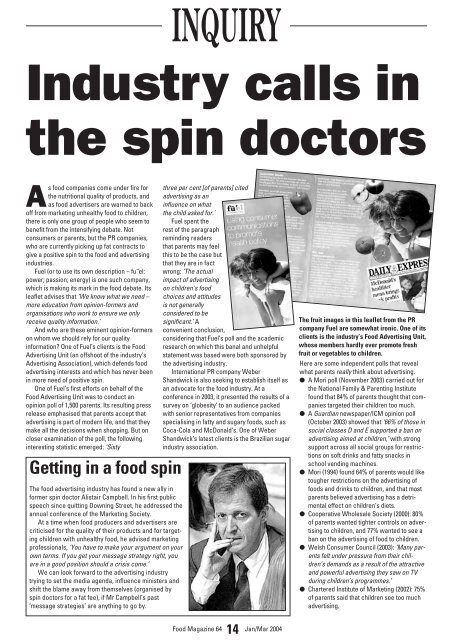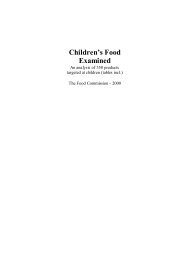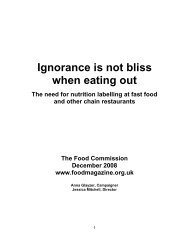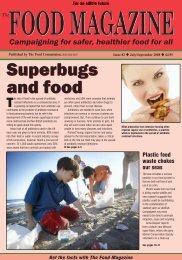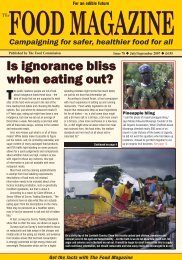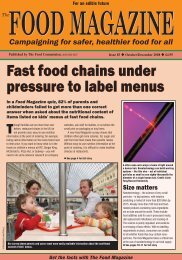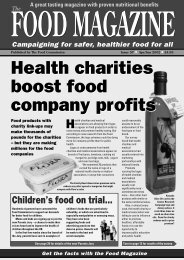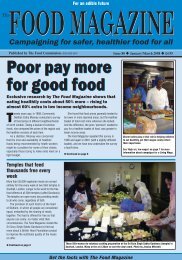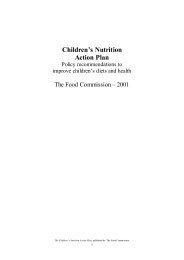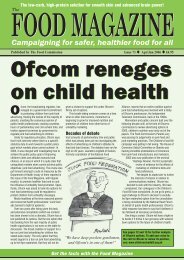INQUIRYIndustry calls inthe spin doctorsAs food companies come under fire forthe nutritional quality of products, andas food advertisers are warned to backoff from marketing unhealthy food to children,there is only one group of people who seem tobenefit from the intensifying debate. Notconsumers or parents, but the PR companies,who are currently picking up fat contracts togive a positive spin to the food and advertisingindustries.Fuel (or to use its own description – fu¯’el:power; passion; energy) is one such company,which is making its mark in the food debate. Itsleaflet advises that ‘We know what we need –more education from opinion-formers andorganisations who work to ensure we onlyreceive quality information.’And who are these eminent opinion-formerson whom we should rely for our qualityinformation? One of Fuel’s clients is the <strong>Food</strong>Advertising Unit (an offshoot of the industry’sAdvertising Association), which defends foodadvertising interests and which has never beenin more need of positive spin.One of Fuel’s first efforts on behalf of the<strong>Food</strong> Advertising Unit was to conduct anopinion poll of 1,500 parents. Its resulting pressrelease emphasised that parents accept thatadvertising is part of modern life, and that theymake all the decisions when shopping. But oncloser examination of the poll, the followinginteresting statistic emerged: ‘SixtyGetting in a food spin<strong>The</strong> food advertising industry has found a new ally informer spin doctor Alistair Campbell. In his first publicspeech since quitting Downing Street, he addressed theannual conference of the Marketing Society.At a time when food producers and advertisers arecriticised for the quality of their products and for targetingchildren with unhealthy food, he advised marketingprofessionals, ‘You have to make your argument on yourown terms. If you get your message strategy right, youare in a good position should a crisis come.’We can look forward to the advertising industrytrying to set the media agenda, influence ministers andshift the blame away from themselves (organised byspin doctors for a fat fee), if Mr Campbell’s past‘message strategies’ are anything to go by.three per cent [of parents] citedadvertising as aninfluence on whatthe child asked for.’Fuel spent therest of the paragraphreminding readersthat parents may feelthis to be the case butthat they are in factwrong: ‘<strong>The</strong> actualimpact of advertisingon children's foodchoices and attitudesis not generallyconsidered to besignificant.’ Aconvenient conclusion,considering that Fuel’s poll and the academicresearch on which this banal and unhelpfulstatement was based were both sponsored bythe advertising industry.International PR company WeberShandwick is also seeking to establish itself asan advocate for the food industry. At aconference in 2003, it presented the results of asurvey on ‘globesity’ to an audience packedwith senior representatives from companiesspecialising in fatty and sugary foods, such asCoca-Cola and McDonald’s. One of WeberShandwick’s latest clients is the Brazilian sugarindustry association.<strong>The</strong> fruit images in this leaflet from the PRcompany Fuel are somewhat ironic. One of itsclients is the industry’s <strong>Food</strong> Advertising Unit,whose members hardly ever promote freshfruit or vegetables to children.Here are some independent polls that revealwhat parents really think about advertising.● A Mori poll (November 2003) carried out forthe National Family & Parenting Institutefound that 84% of parents thought that companiestargeted their children too much.● A Guardian newspaper/ICM opinion poll(October 2003) showed that ‘66% of those insocial classes D and E supported a ban onadvertising aimed at children,’ with strongsupport across all social groups for restrictionson soft <strong>drinks</strong> and fatty snacks inschool vending machines.● Mori (1994) found 64% of parents would liketougher restrictions on the advertising offoods and <strong>drinks</strong> to children, and that mostparents believed advertising has a detrimentaleffect on children’s diets.● Cooperative Wholesale Society (2000): 80%of parents wanted tighter controls on advertisingto children, and 77% wanted to see aban on the advertising of food to children.● Welsh Consumer Council (2003): ‘Many parentsfelt under pressure from their children’sdemands as a result of the attractiveand powerful advertising they saw on TVduring children’s programmes.’● Chartered Institute of Marketing (2002): 75%of parents said that children see too muchadvertising.<strong>Food</strong> Magazine 64 14 Jan/Mar 2004
food taxesFight fat the fiscal way!Improving public health takes action from all government departments:health, education, transport, environment, media, sport,planning, trade, agriculture – and the Treasury. Tim Lobsteinlooks at some fiscal measures that could help shape our diets.From setting income support levels to theprices of imported goods, the Treasuryplays a role in shaping our access tofood, and hence our diet. And just as parentsattempt to control the diets their childrenconsume through controls over their pocketmoney, so the government can do much moreto link consumer spending to public health.<strong>The</strong> idea is hardly new – tobacco has beenseverely taxed for many years, to discouragesmoking and recoup some of the costs oftobacco-related disease. With the WHO nowshowing that diets are responsible for asmuch disease as tobacco, the prospect offiscal intervention in our food supply mustsurely tempt the Treasury. Here are someideas on how it could happen:1. Value added tax (VAT)Most food in the UK is VAT-free, with somenotable exceptions and peculiar distinctions.<strong>The</strong> exceptions were originally part of a vaguenotion that snacks should be taxed while mealitems should not, but the difference was neverclear and the subsequent rulings have madethe definitions ever more complex.Table 1 shows a few of the anomalies. It isclearly time for a review of the foods that arestandard-rated. This review should beundertaken in the light of modern dietarypatterns and the government’s Chief MedicalOfficer’s advice on healthy eating.Care should be taken so that the extra VATdoes not further disadvantage poorerhouseholds, where food is a major part of theweekly budget. A rise in the price of somefoods may need to be offset by a fall in theprice of others.2. Snack taxesSome countries apply sales taxes to foods: inFrance, for example, VAT of 20.6% is added tosweets, chocolates, margarine and vegetablefat, while other foods are rated at 5.5%.In Canada, sales taxes are charged on soft<strong>drinks</strong>, sweets and snack foods. Similar snacktaxes have been levied in several US states:Jacobson and Brownell* list 19 states in theyear 2000 with snack taxes, and a further 12where snack taxes had been introduced butlater abolished – largely, they suggest, due toindustry pressure. <strong>The</strong> tax levied wasgenerally low, typically 3%-7% of sales price,but it raised tens of millions of dollars for therelevant state authority annually.In 1988 Californians supported a 25 cent taxon cigarette packs, raising $90m annually fortobacco control and health promotion. Thisring-fencing or hypothecation of a sales tax, toensure it goes to promoting health, increasedits popularity among the public. Similar movescould be undertaken with food.3. CAP recovery levies<strong>The</strong> Common Agricultural Policy is costing theEuropean Union’s tax payers some 40bn Eurosannually. Both the sugar and dairy sectorshave been described by the European Court ofAuditors as chronically overproducing – withsome of the surplus exported to cause ill-healthelsewhere, while much of it goes into our foodsupply in hidden and subsidised forms. Muchcould be done to improve this situation.Butter is a particular problem, with nearly athird of EU butter production bought up by theEuropean <strong>Commission</strong> and sold cheaply (i.e.with public subsidy) to food manufacturers tomake products such as pastries and icecream. Fruit and vegetable payments in theCAP help producers destroy crops in order to‘protect’ the market, i.e. keep prices high – aclear opportunity to intervene for better health.A subsidy-recovery levy, in which GordonBrown takes back money paid to the sugar,butter, meat and oil producers, would lead toprice rises for these commodities, as theymove from producers into food manufacturing.Manufacturers might think again about theirrecipes, cutting their use of fats and sugars.4. Marketing taxAn advertising tax is likely to be fiercelyresisted by broadcasters and the advertisingindustry. However, a levy in which everyadvert for junk food had to cover the cost ofan advert for healthy food might appeal topoliticians who are resisting pressure for anoutright ban. It might also please advertisingagencies and the media. A ratio of, say, sevenhealthy food adverts for every unhealthy one,to encourage a balance in line with healthyeating guidelines, might be even better!■ M Jacobson, K Brownell, Am J Pub Health(2000) www.cspinet.org/reports/jacobson.pdf.Standard-rated and zero-rated VAT on food in the UKStandard-ratedconfectionerybiscuits with chocolate coveringsice cream, gateau, frozen cakesmarshmallowssweetened cereal bars, muesli barscrisps, puffed snacks, roasted nutsice cream, water ices, sorbetsfruit <strong>drinks</strong>, juices and concentratesmonosodium glutamatehot take-away foodbread in take-away, e.g. burger and pitta;bread with restaurant mealssesame barschocolate raisins, sugar almondsMarron glacémineral waterFrom HM Customs and Excise Notice 701/14Zero-ratedchocolate spread, cake decorationsother biscuits including iced, caramelcoatedand choc-chip cookiescakes, jaffa cakes, baked Alaskamarshmallow teacakesoat biscuits, flapjackstortilla chips, roasted nuts in shellsfrozen yogurt if thawed before eating,ice cream sauces and toppingsmilkshakessalt, additives, flavourings, sweetenerssandwichesbread, rolls, pitta and other bread productshalvatoffee applesglacé cherriescocoa, drinking chocolate<strong>Food</strong> Magazine 64 15 Jan/Mar 2004


